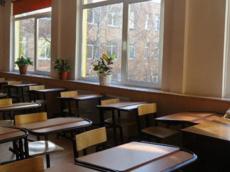|
|
TODAY.AZ / Society
Assessing societal effects of school re-opening among factors to consider amid COVID-19
27 August 2020 [12:15] - TODAY.AZ

By Trend
Assessing the societal effects of school re-opening is among factors to consider in deciding how or when to partially close or reopen schools in the COVID-19 context, the World Health Organization (WHO) representative told Trend.
The WHO, UNICEF, and the International Federation of the Red Cross and Red Crescent Societies jointly issued guidance to help protect children and schools from the transmission of the COVID-19 virus.
The guidance provides critical considerations and practical checklists to keep schools safe. It also advises national and local authorities on how to adapt and implement emergency plans for educational facilities.
This guidance also includes suggestions on how to engage students of different ages on preventing and controlling the spread of COVID-19 and other viruses and recommends having solid plans in place to ensure the continuity of learning, including remote learning options such as online education strategies and radio broadcasts of academic content, and access to essential services for all children.
“Additional factors to consider in deciding how or when to partially close or reopen schools include assessing societal effects of school re-opening (e.g. risk of non-return to school, widening disparity in educational attainment, limited access to meals, domestic violence aggravated by economic uncertainties, etc.), and the need to maintain schools at least partially open for children whose caregivers are ‘key workers’ for the country,” the WHO official said.
The official noted that WHO and UNICEF have recently had also issued advice on the use of masks for children in the community in the context of COVID-19.
“This guidance is for public health officials, child health professionals, and educators to make decisions about age-appropriate use of masks to prevent and control COVID-19 transmission. While masks alone will not protect children from COVID- 19 they are part of a comprehensive package of measures to suppress transmission and save lives. WHO and UNICEF provide advice for children which is age-specific based upon their risks and abilities,” the official said.
Thus, WHO and UNICEF advice for mask use among children depend on their age and situation:
- Children aged 5 years and under should not wear fabric masks.
- A risk-based approach should be used in deciding if children age 6 to 11 years old should wear a fabric mask in areas where there is widespread transmission according to specific considerations, such as adult supervision and the ability to use a mask safely.
- Children age 12 and older should follow the same guidance for mask use as adults, in areas where there is the widespread transmission and physical distancing cannot be achieved.
- Children with underlying health conditions should wear a medical mask in consultation with their medical providers.
“It is important to keep in mind that the mask by itself is insufficient and should be used in combination with other measures. Children need to be educated on the importance of physical distancing, clean hands, and other measures to prevent transmission. it is important for adults to talk with them, answer their questions, and address their fears,” the official emphasized.
URL: http://www.today.az/news/society/196656.html
 Print version
Print version
Connect with us. Get latest news and updates.
See Also
- 18 April 2024 [20:10]
Ombudsman representatives attend Environmental Security & Green World Conference - 17 April 2024 [16:47]
OSCE acting chairperson to visit Azerbaijan - 17 April 2024 [15:34]
Employability Week held at ADA University - 17 April 2024 [14:56]
Azerbaijan to increase number of high schools, gymnasiums in all regions, says Minister - 16 April 2024 [14:53]
MoU on establishment of Turkiye-Azerbaijan University approved - 16 April 2024 [12:17]
Opening ceremony of "Caspian Basin Studies" program held at ADA University - 15 April 2024 [12:55]
Heydar Aliyev Foundation takes over former footballer Vadim Vasilyev's treatment - 15 April 2024 [10:00]
Earthquake hits Azerbaijan's Imishli district - 14 April 2024 [15:37]
Zakir Hasanov met with the commander of the Jordanian Air Force - 14 April 2024 [14:18]
Azerbaijan, Jordan defence ministries clinch agreement
Most Popular
 EU acknowledges strategic significance of Baku International Sea Trade Port in Middle Corridor
EU acknowledges strategic significance of Baku International Sea Trade Port in Middle Corridor
 Weapons & ammunition discovered in Khankendi
Weapons & ammunition discovered in Khankendi
 South Korea conducts live-fire exercises near borders of DPRK
South Korea conducts live-fire exercises near borders of DPRK
 Azerbaijani Army units conduct inspection in military equipment
Azerbaijani Army units conduct inspection in military equipment
 TikTok closed in Kyrgyzstan
TikTok closed in Kyrgyzstan
 Azerbaijan's AccessBank joins UN Global Compact
Azerbaijan's AccessBank joins UN Global Compact
 Navigating challenges in Azerbaijan's trade turnover amidst global uncertainties
Navigating challenges in Azerbaijan's trade turnover amidst global uncertainties
